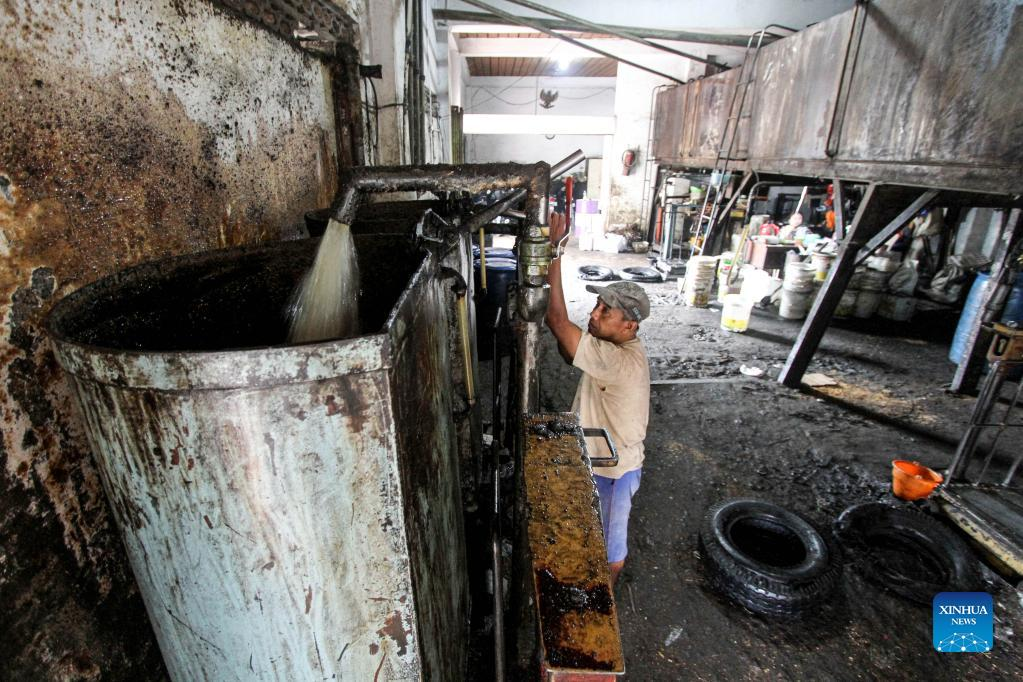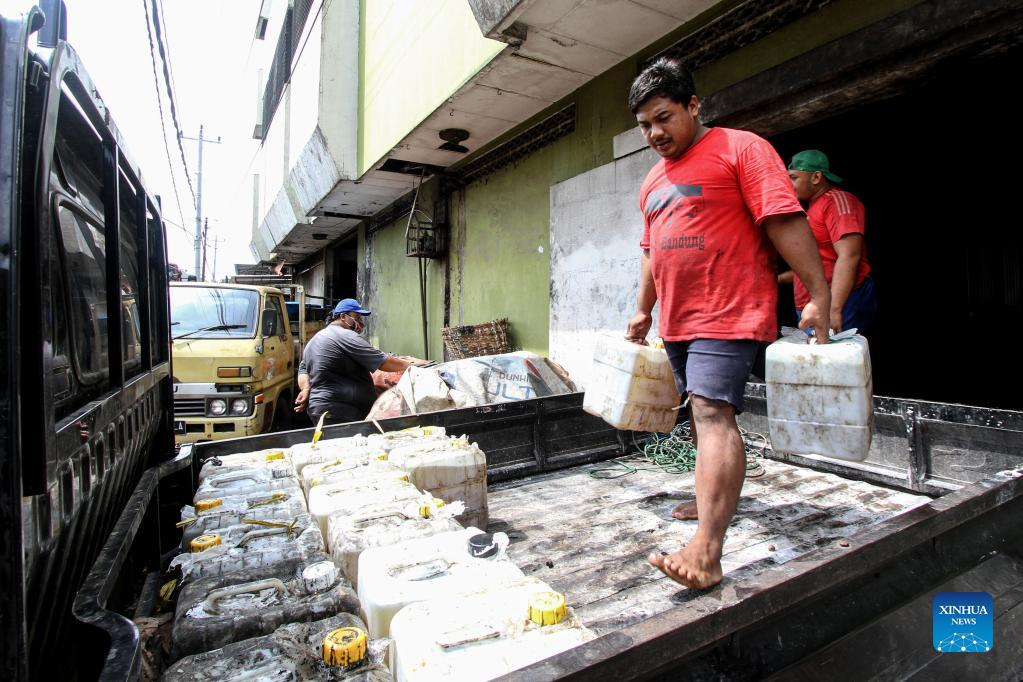
A worker processes cooking oil at Pasar Legi traditional market in Surakarta, Central Java, Indonesia, April 26, 2022. As the world's largest palm oil producing country, Indonesia has been suffering acute shortages and high prices of cooking oil, which derives mainly from palm oil, since the end of last year. (Photo by Bram Selo/Xinhua)
by Wang Aona, Nurul Ramadhan
JAKARTA, April 26 (Xinhua) -- The Indonesian government has recently announced that starting April 28, it will suspend exports of crude palm oil (CPO) and its derivatives to ensure domestic supplies.
President Joko Widodo argued during the announcement last Friday that the export ban was needed to "stabilize the oil prices at home," and promised to re-evaluate the policy "when the cooking oil had become affordable again."
As the world's largest palm oil producing country, Indonesia has been suffering acute shortages and high prices of cooking oil, which derives mainly from palm oil, since the end of last year.
Local media reported that supplies might still be found in supermarkets but the prices had jumped beyond the usual retail prices, triggering nationwide protests.
The overall condition has raised questions over how Indonesia could experience cooking oil shortage at home as the country represents more than half of the world's CPO supplies with an export volume of about 28 million metric tons in 2021, according to the 2022 report by market data company Statista.
Indonesian Trade Minister Muhammad Lutfi has said that one of the factors for the high prices is the conflict between Russia and Ukraine.
As Russia and Ukraine are key producers of sunflower oil, the conflict has disturbed the supply from the two nations, which then forces some of their buyers to switch to palm oil as an alternative because the two varieties share similar characteristics, according to Lutfi.
"This condition has led to increasing demands of CPO exports and the soaring global CPO prices and we did not predict this (the conflict) before," Lutfi said.
Before the announcement of the export ban, although the Indonesian government has been trying to subsidize varieties of cooking oil to make them more accessible for the poor, it turned out ineffective.
In January, the government introduced a retail price cap for cooking oil at 14,000 rupiahs (0.97 dollars) per liter, before which the prices could be 40 percent higher, but the cap was removed in March because it instead led to panic hoarding and worsening scarcity.
Earlier this month, as an attempt to stabilize the local market, the government launched the cooking oil subsidization in the form of a cash transfer scheme to 20.5 million low-income families and 2.5 million street vendors who sell fried foods, with each of them receiving 300,000 rupiahs (about 20.7 U.S. dollars).
Economic analyst Ronny Sasmita from think-tank Indonesia Strategic and Economic Action Institution said such a subsidy would unlikely be distributed properly to the beneficiaries.
The Indonesian Ombudsman, a state institution authorized to oversee the implementation of public services, released a 2020 report revealing that social aid distribution system in Indonesia is not yet transparent and accountable, with the weak supervision in the process, inconsistency in procedures and database of the beneficiaries.
Therefore, the total of 6.9 trillion rupiahs (about 477 million dollars) allocated from the 2022 state budget, which was aimed at helping the poor, would likely mainly go to the pockets of the cartels, Sasmita said.
Now the same doubt as to the policy effectiveness has also been raised over the decision to ban palm oil exports.
Economic expert and Director of Center of Economic and Law Studies (CELIOS), Bhima Yudhistira, said the export ban would not solve the problems with cooking oil in the country, and instead, the government would only repeat the same mistake when it imposed a coal export ban back in January.
"The palm oil ban will make Indonesia lose foreign exchange from export up to 3 million dollars, or up to 12 percent from the country's total non-oil and non-gas exports," Yudhistira said, adding that the ban might also cause Indonesia to lose its export markets and pinch palm oil farmers.
Indonesia's largest palm oil buyers are India, Pakistan, the United States, Malaysia and Bangladesh. Other major buyers include China, Egypt, Russia and Spain, according to latest data from the Statistics Indonesia.
"Banning export is not effective to stabilize domestic cooking oil prices, because the main problem here is in the uncontrolled producers and the unsound distribution system," Yudhistira said. ■

A worker carries cooking oil to a vehicle for distribution at Pasar Legi traditional market in Surakarta, Central Java, Indonesia, April 26, 2022. As the world's largest palm oil producing country, Indonesia has been suffering acute shortages and high prices of cooking oil, which derives mainly from palm oil, since the end of last year. (Photo by Bram Selo/Xinhua)



